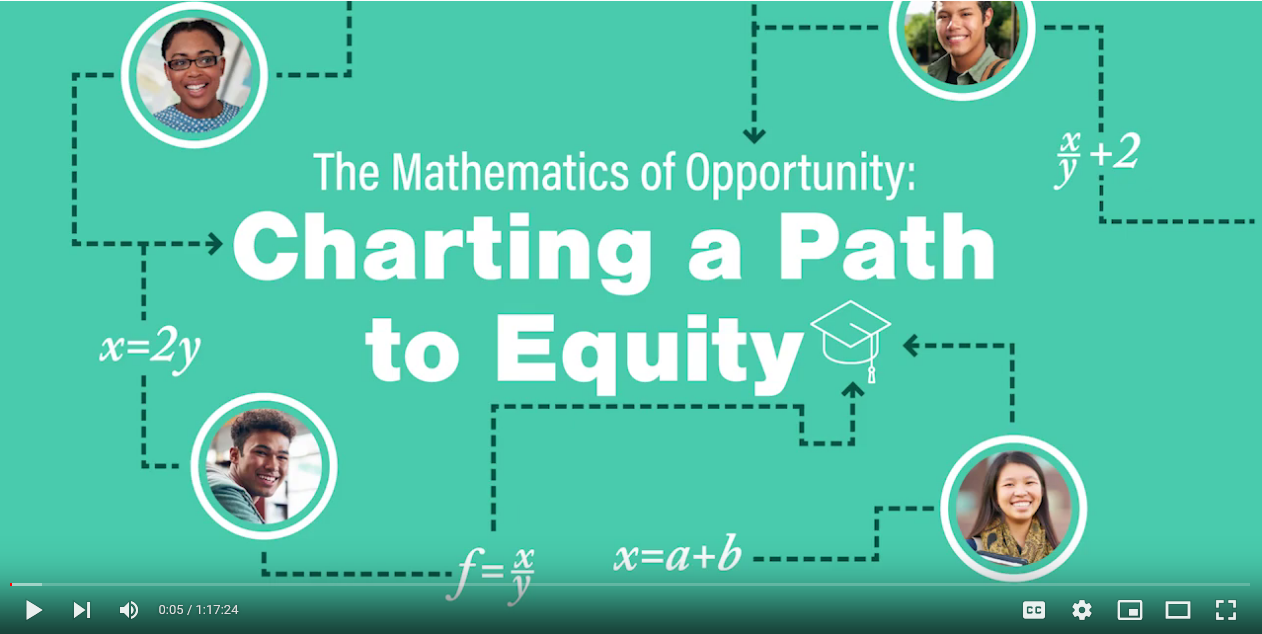“Who gets to learn are the people with the opportunity.”: Equity in Data Science Education

guest post by Erica Heinzman, University of California San Diego
In March, Rachel Levy, Executive Director of the NC State Data Science Academy, moderated a panel focused on a core data science challenge: centering equity in data science education.
Who gets to learn data science and who gets to decide who learns data science were key questions for the panel, part of a March conference hosted by Just Equations.
Panelist William Murphy, a sophomore philosophy major at Morehouse College, made a passionate call to expand access to data science education.
“There are a number of factors of who gets to learn data science and I can attest to that. In high school, I didn’t know what data science was…who gets to learn are the people with the opportunity,” he said.
“My introduction to data science actually, surprisingly, came in the form of a video game,” Murphy added. He described the game’s statistical basis as an “informal way” into data science.
Luckily, when he got to Morehouse College, Murphy enrolled in Nathan Alexander’s Statistics class, which led to data science becoming “a passion.” Now, he’s conducting data science research while pursuing his ambition of becoming an attorney.
One panel, many voices
Murphy shared his student viewpoint and his fellow panelists wear many hats and serve in a variety of roles within data science education community including:
- Instructor.
- Curriculum author.
- Scholar.
- Researcher.
- Mathematician.
- Program director.
The panel’s diverse perspectives led to a lively exchange and reflected the need for multiple viewpoints as data science education welcomes an ever-broader range of learners.
Monica Casillas, Associate Director of Professional Development for the Introduction to Data Science (IDS) course, shared how teaching data science in the Los Angeles Unified School District inspired her.
“The happiest years of my teaching career were when I was teaching IDS, hands down,” she said. When asked why, her answer was simple: “The data is relevant to the students.”
Like Murphy at Morehouse, Casillas’ high school students had an opportunity to see how mathematics connected to their lives. Casillas’ journey has taken her from pilot IDS teacher to her current role leading professional learning for the curriculum.
In universities, instructors like Nathan Alexander, Assistant Professor of Data Science and Interdisciplinary Studies at Morehouse, make sure students like Murphy continue to have data science opportunities, in and out of formal education.
Adding community to the equation
Alexander also directs the Du Bois Data Lab, a historically-centered and critically-oriented experiential learning lab for students and community members. “The goal is to bring in community voices,” he said.
Alexander explained why community voices are central to his work.
“What does it mean to bring those voices in,” he asked, then shared examples of his lab’s work. “Some of the work we are doing in our lab is literally connecting our students to the communities right around us and finding ways to connect that to local policy efforts,” he explained, adding, “[w]e are flipping the narrative. We [faculty and students] say we are the learners.”
Shifting advising
Another panelist, Ji Son, professor of psychology at California State University at Los Angeles, welcomes how data science has shifted academic advising in high schools. She’s a co-author of CourseKata, an interactive data science high school and undergraduate textbook, and sees advisors changing their language.
Instead of “you should go into this [math] class because you are not good at math, [n]ow [advisors] are saying, you would be really interested in this type of math or asking what type of math interests you,” she said.
Every panelist shared a practical approach to broadening access to data science education, including:
- Removing barriers to entry.
- Rethinking curricula.
- Supporting advising.
- Including student and community voices when developing and assessing data science education.
Bringing it all together
As the panel moderator, Rachel Levy, the inaugural Executive Director of the NC State Data Science Academy and Professor of Mathematics, brought the panelists’ points together.
Levy shared NC State’s novel approach to making data science accessible and relevant to all its students. “We want everyone to level up in data science. I am not just thinking about students as potential learners but also as teachers. Our students are helping run classes,” she said.
The Data Science Academy’s one-credit, project-based courses are open to all NC State students, faculty, postdocs and staff. Topics range from introductory (no prerequisite) to advanced, where students use their own data sets to complete course projects.
As students, instructors, researchers, textbook authors and more, the “Centering Equity in Data Science Education” panelists shared a commitment to centering equity in data science education. Their commitment is helping move the conversation – and practical solutions – forward.
Watch the full panel
About Just Equations
Just Equations, a policy and advocacy organization, seeks to ensure that mathematics is a gateway to college, career and civic life by advocating for access to rigorous and meaningful mathematics that reflects students’ interests and aspirations.
Just Equations hosted The Mathematics of Opportunity: Charting a Path to Equity in March 2022. The three-day virtual event featured nationally known speakers and a series of deep-dive sessions focused on topics ranging from the role of mathematics in college admissions to emerging K-12 mathematics pathways.
The “Centering Equity in Data Science Education” panel was sponsored by The Opportunity Institute.
- Categories: